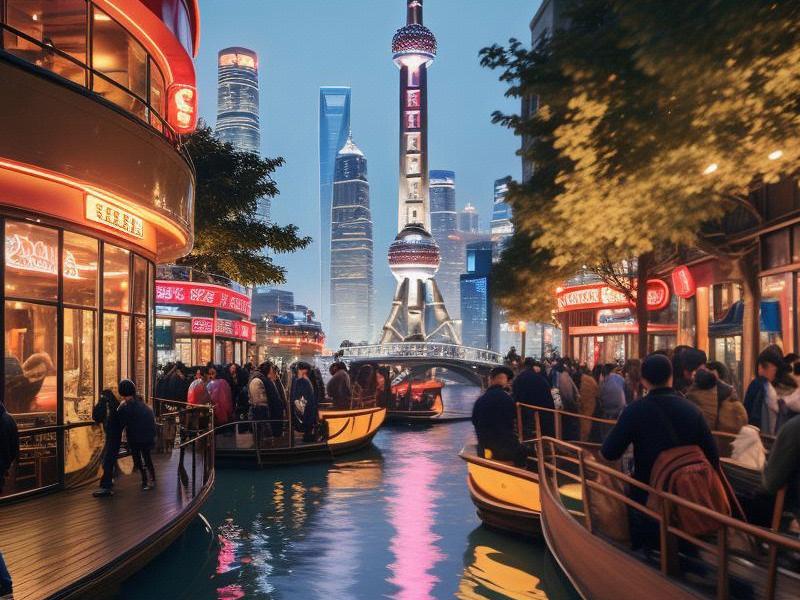This article delves into the burgeoning leisure economy in Shanghai, exploring the city's vibrant entertainment scene, booming tourism industry, and rich cultural activities that are shaping a new era of leisure and relaxation for its residents and visitors alike.

Shanghai, the bustling metropolis of China, has long been a symbol of economic prosperity and cultural diversity. In recent years, however, the city has also emerged as a hub for leisure and entertainment, with its leisure economy rapidly expanding and transforming the way residents and visitors spend their free time.
The concept of a leisure economy refers to the portion of an economy that is driven by the demand for leisure activities, including entertainment, tourism, dining, shopping, and cultural experiences. In Shanghai, this sector has witnessed remarkable growth, fueled by the city's increasing disposable income, changing lifestyles, and government initiatives to promote a high-quality lifestyle.
One of the most significant drivers of Shanghai's leisure economy is its vibrant entertainment scene. The city boasts an array of world-class theaters, concert halls, and music venues, attracting top international artists and local talent alike. From the grandeur of the Shanghai Grand Theatre to the intimate ambiance of the JZ Club, there is something for everyone in terms of live performances.
In addition to traditional entertainment options, Shanghai has also embraced digital and interactive entertainment. The city is home to several state-of-the-art gaming arcades, virtual reality centers, and esports venues, catering to the growing popularity of these new forms of entertainment. These establishments not only provide a source of fun but also contribute to the development of Shanghai's digital economy.
上海花千坊419
Tourism is another key component of Shanghai's leisure economy. The city's rich history, stunning architecture, and vibrant culture make it a popular destination for both domestic and international tourists. Iconic landmarks such as the Bund, Oriental Pearl Tower, and Yu Garden draw millions of visitors each year, while the city's numerous museums, art galleries, and cultural institutions offer a deeper dive into Shanghai's past and present.
To further enhance its appeal as a tourist destination, Shanghai has invested heavily in infrastructure and tourism facilities. The city's metro system, which connects all major attractions, is efficient and convenient, making it easy for visitors to explore the city. Additionally, Shanghai has developed several new tourist districts, such as the Lujiazui Financial District and the Xintiandi Cultural and Creative Zone, which combine modern architecture with traditional Chinese elements to crteeaunique and memorable experiences.
Cultural activities also play a crucial role in Shanghai's leisure economy. The city is home to a diverse range of cultural festivals, exhibitions, and events that celebrate its rich heritage and foster a sense of community. From the Shanghai International Film Festival to the Shanghai Fashion Week, these events not only attract visitors but also provide a platform for local artists, designers, and performers to showcase their talents.
上海喝茶服务vx
In recent years, Shanghai has also made significant efforts to promote cultural tourism, blending the city's historical and modern elements to crteeaunique travel experiences. For example, the city has developed themed tours that take visitors through the historic French Concession, the former International Settlement, and the trendy areas of Hengshan Road and Nanjing Road. These tours provide a glimpse into the city's past while highlighting its contemporary charm.
The growth of Shanghai's leisure economy has also been supported by government initiatives aimed at improving the quality of life for its residents. The city has invested in public spaces, parks, and recreational facilities, making it easier for people to enjoy outdoor activities and stay active. The Bund Promenade, Century Park, and Yangpu Riverside Park are just a few examples of the many green spaces that offer residents and visitors a chance to relax and unwind.
Moreover, Shanghai has also focused on promoting healthy lifestyles and wellness activities. The city has seen a rise in fitness centers, yoga studios, and health spas, catering to the growing demand for wellness services. Additionally, the city has organized various sports events and marathons, encouraging residents to engage in physical activities and stay fit.
上海娱乐联盟
The leisure economy in Shanghai is not without its challenges. As the city continues to grow and develop, it must balance the need for economic growth with the preservation of its cultural heritage and the well-being of its residents. The rapid pace of urbanization and the influx of tourists can sometimes strain the city's infrastructure and resources, necessitating careful planning and management.
To address these challenges, the Shanghai municipal government has implemented various measures to ensure sustainable development. These include promoting green tourism, encouraging the use of public transportation, and investing in the preservation of historical sites and cultural landmarks. The government has also worked to improve the quality of leisure services, ensuring that residents and visitors have access to safe, clean, and enjoyable experiences.
Despite these challenges, the leisure economy in Shanghai continues to thrive, offering a wide range of entertainment, tourism, and cultural activities that cater to the diverse needs and preferences of its residents and visitors. The city's vibrant entertainment scene, booming tourism industry, and rich cultural activities are not only enhancing the quality of life for its residents but also contributing to the city's economic growth and global reputation.
In conclusion, Shanghai's leisure economy is a testament to the city's dynamic and innovative spirit. By embracing new forms of entertainment, investing in tourism infrastructure, and promoting cultural activities, Shanghai is creating a new era of leisure and relaxation for its residents and visitors. As the city continues to grow and evolve, its leisure economy will undoubtedly play a crucial role in shaping its future and solidifying its position as a global leader in entertainment, tourism, and cultural experiences.